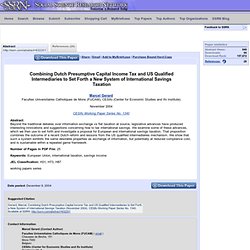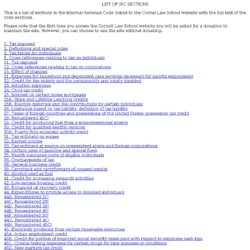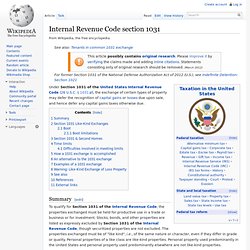

Foreign Account Tax Compliance Act (FATCA) 2001.01.01 IRS sign QUALIFIED INTERMEDIARY agreements. 2000.12.01 Application Procedures for Qualified Intermediary Status. 2004.11 Dutch Presumptive Capiatl Income Tax / US Qualified Intermediaries. Facultes Universitaires Catholiques de Mons (FUCAM); CESifo (Center for Economic Studies and Ifo Institute)November 2004 CESifo Working Paper Series No. 1340 Abstract: Beyond the traditional debates over information exchange vs flat taxation at source, legislative advances have produced interesting innovations and suggestions concerning how to tax international savings.

We examine some of these advances, which we then use to set forth and investigate a proposal for European and international savings taxation. That proposition combines the outcome of a recent Dutch reform and lessons from the US qualified intermediaries mechanism. Number of Pages in PDF File: 25 Keywords: European Union, international taxation, savings income JEL Classification: H31, H73, H87 working papers series Suggested Citation Gerard, Marcel, Combining Dutch Presumptive Capital Income Tax and US Qualified Intermediaries to Set Forth a New System of International Savings Taxation (November 2004). List of sections of the Internal Revenue Code. This is a list of sections in the Internal Revenue Code linked to the Cornel Law School website with the full text of the code sections.

Please note that the first time you access the Cornell Law School website you will be asked for a donation to maintain the site. However, you can choose to use the site without donating. 1. Tax imposed. Internal Revenue Code section 1031. For former Section 1031 of the National Defense Authorization Act of 2012 (U.S.), see Indefinite Detention: Section 1021 Under Section 1031 of the United States Internal Revenue Code (26 U.S.C. § 1031), the exchange of certain types of property may defer the recognition of capital gains or losses due upon sale, and hence defer any capital gains taxes otherwise due.

Summary[edit] To qualify for Section 1031 of the Internal Revenue Code, the properties exchanged must be held for productive use in a trade or business or for investment. Stocks, bonds, and other properties are listed as expressly excluded by Section 1031 of the Internal Revenue Code, though securitized properties are not excluded. The properties exchanged must be of "like kind", i.e., of the same nature or character, even if they differ in grade or quality. Real properties generally are of like kind, regardless of whether the properties are improved or unimproved. Section 1031 Like-Kind Exchanges[edit] Boot[edit]